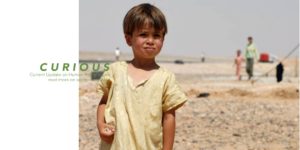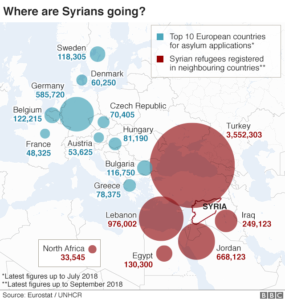
“Refugees have no choice, YOU DO. Let’s help save lives.”
by Affi-CIMSA UGM
BACKGROUND
Who is a refugee?
A refugee is someone who has been forced to flee his or her country because of persecution, war or violence. – UNHCR
A refugee leaving their homes is most likely afraid or cannot return home as prosecutions for reasons of race, nationality, political opinion, membership in particular group, or because of natural disasters that destroyed their homes.
Who is an internally displaced person?
An internally displaced person, is someone who has been forced to flee their home but never cross an international border. These individuals seek safety anywhere they can find it—in nearby towns, schools, settlements, internal camps, even forests and fields – UNHCR
Unlike refugees, internally displaced people basically are not protected by international law or able to receive any aids and helps because they are still legally under protection of their own government.
What is refugee crisis?
Refugee crisis is when the number of refugee is exploding and they cannot be treated as they supposed to be or there are no adequate facilities for them.
Why is refugee becoming a human right issue?
When they are losing their homes, they are not only losing their place to stay, but also they lose their shelter, their rights to be feeling safe and not to be threatened to come back home. Refugees are always haunted by their uncertain future or whether the conflict will subside so they can get back their own peace on their own countries. They are basically dwelling in a “stranger’s” place.
Two-thirds of all refugees worldwide come from just five countries: Syria, Afghanistan, South Sudan, Myanmar and Somalia.
The civil war in Syria has been going on for the last eight years. All along that time, there have been many human rights violations happened. As the war persists, there has been many attacks and deaths affecting all groups of people: women, children, disabled, and elderly.
Case Percentage
More than 500,00 people are missing (364.371 people) or presumed dead (156,900 people). More than half Syrians have been uprooted from their homes since 2011, some have fled abroad while others are internally displaced. Physicians for Human Rights documented 492 attacks on 330 medical facilities by the end of December 2017, resulting in the deaths of 847 medical personnel.

95% of people lack adequate healthcare and 70% lack regular access to clean water. Half of the children are out of school. The economy is shattered, and 80% of the population lives in poverty.
MAIN CONTENT
What is happening in Syria?
Long before the war began, many Syrians have been protesting about high unemployment, corruption, and lack of political freedom after President Bashar al-Assad took over presidency after his father died in 2000. It all began in March 2011 when pro-democracy activists, inspired by Arab Spring successful uprisings in neighboring countries, blew up in Deraa, Southwestern Syria. The Syrian government responded to this protest by killing and imprisoning hundreds of demonstrators, escalating the conflict to outspread of civil war. It gets even more complicated as certain groups and other countries have got involved in this war.
In the last 8 years, the war continues with different groups trying to seize control of Syria. The conflict is between
- Groups who oppose President Bashar al-Assad called as “the rebels”
- Soldiers who support President Bashar al-Assad
- Group that calls itself as Islamic State (IS)
- Other countries that got involved (Russia, Iran, Israel, United Kingdom, France, etc)
The civil war has been affecting Syrians in all side of their life. They have to move out from their homes and even fled to other countries to seek safety, especially to Europe as it is the nearest destination for them. Living in Syria becomes very unbearable for them especially since violence from the start of the civil war has killed thousands of people and among them are children. It also becoming really distressful and dangerous for Syrian children as they suffered injuries, missed years of schooling, and experienced unspeakable violence and brutality.
The war looks like will not end in anytime soon as political solution from all parties is required. Hopefully, there will be no more attacks coming sooner or later or more sufferings might come to the Syrians.
ADDITIONAL CONTENT
What are Syrians’ greatest needs?
Syrians fleeing conflict often leave everything behind. So they need all the basics to sustain their lives: food, clothing, healthcare, shelter, and household and hygiene items. Refugees also need reliable supplies of clean water, as well as sanitation facilities. Children need a safe environment and a chance to play and go to school. Adults need employment options in cases of long-term displacement.
What can we do?
Learn more and aware: As we learn about what happen in Syria and how the war is affecting them, we will become more aware to the situation and decide what acts should we do to help Syrian refugees.
Spread: There are still many people around us who do not know about the conflicts going on in Syria. It is our responsibility as one of human rights proponent to tell them what is going on and spread the awareness to our surroundings.
Speak up: Ask our nearest stakeholders to prioritize the refugee crisis in humanitarian funding decisions.
Give: Donate and pray. There are several available organizations who channel helps towards Syrian refugees.
IMPORTANT CONTACT
Aksi Cepat Tanggap
The UN Refugee Agency
REFERENCES
https://www.bbc.com/news/world-middle-east-35806229
https://www.aljazeera.com/news/2016/05/syria-civil-war-explained-160505084119966.html
http://www.unhcr.org/syria-emergency.html